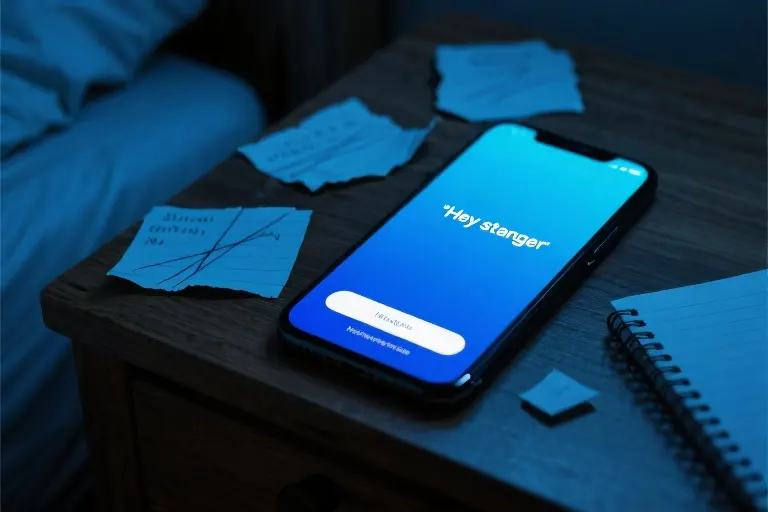The screen stays dark for the seventh consecutive hour. Your thumb hovers over the keyboard, retyping that unsent message for the third time. Outside, life moves on – cars honk, neighbors laugh, the coffee in your mug grows cold. But here in this digital limbo, time stretches like taffy, each minute heavier than the last.
Love is not a notification that arrives just before you lose hope.
It’s not the sporadic “thinking of you” that comes three days too late.
It’s not their unpredictable availability that leaves you constantly recalibrating your expectations.
(Then why does your chest still tighten when his name finally appears?)
We’ve become archaeologists of affection, scraping through layers of mixed signals for fossilized proof of care. That 2AM “u up?” text gets framed as intimacy. The occasional heart reaction to your stories becomes a exhibit in your mental courtroom: See? He does care. Meanwhile, your friends exchange knowing glances when you mention his latest disappearance act.
This isn’t love – it’s emotional rationing during wartime. We’ve normalized starvation portions of attention, celebrating crumbs as feasts. That sudden phone call after radio silence floods your system with relief chemicals, the emotional equivalent of finding water in the desert. But healthy relationships shouldn’t feel like survival scenarios.
Your phone buzzes.
(It’s not him.)
The realization lands like a stone in your stomach. You know this dance too well – the frantic checking, the invented excuses, the way you’ve memorized his typing patterns like sacred texts. Somewhere between his last “sorry, busy” and your thousandth overanalysis of a punctuation mark, love got reduced to a guessing game.
Here’s what no one tells you about breadcrumbing: the hunger isn’t accidental. These carefully measured doses of attention create the perfect addiction cycle. Psychologists call it intermittent reinforcement – the same mechanism that keeps gamblers glued to slot machines. Each unpredictable reward trains your brain to wait longer, hope harder, settle for less.
(Stop feeding the machine.)
Today’s dating landscape runs on this unspoken economy of minimal effort. We’ve developed entire coping mechanisms around digital neglect: “Maybe his notifications are off”, “She’s probably just bad at texting”, “It’s the algorithm hiding my posts”. But strip away the rationalizations, and the truth remains: people make time for what matters to them. Always.
Your thumbs move automatically, pulling up your last conversation. That growing green bubble graveyard tells its own story – questions asked but never answered, invitations left hanging, your enthusiasm slowly deflating like a balloon after a party. The evidence was there all along, written in the negative space between his replies.
Put the phone down.
Not dramatically, not forever – just long enough to feel the weight of what you’ve been carrying. That constant low-grade anxiety isn’t butterflies; it’s your nervous system sounding the alarm. The right relationship won’t leave you stranded in these endless cycles of anticipation and disappointment.
Love isn’t something you mine from sparse data points. It shows up in broadband, not dial-up connections. It’s the difference between someone who fits you into their schedule versus someone who builds their schedule around you. Between “I’ll let you know” and “I’ve already marked my calendar.”
Tomorrow, when you inevitably reach for your phone again, ask this instead: Does this feel like nourishment or starvation? Am I being valued or just validated?
The answers might ache, but they’ll set you free.
The Hunger Games of Digital Dating: 10 Signs You’re Settling for Crumbs
Your phone lights up with a notification. Heart racing, you swipe open – only to find another promotional email. The screen dims again. It’s been 37 hours since his last text. But you’re already crafting excuses: Maybe he’s swamped at work… Maybe his phone died… Maybe I came on too strong last time…
This isn’t love. This is what psychologists call ‘breadcrumbing’ – being fed just enough attention to keep you hooked, while never receiving the emotional nourishment you truly deserve. Let’s decode the modern dating red flags you’ve been rationalizing away.
The 2023 Low-Effort Relationship Playbook (With Real Chat Examples)
- The Phantom Texter
“Hey stranger 😘” (sent at 1:17AM after 8 days of silence)
- These random reappearances exploit our brain’s dopamine system like slot machines – the unpredictability makes you crave the next “win”
- The Bare Minimum Celebrator
“You’re amazing btw” (followed by zero follow-up questions about your life)
- When compliments replace consistent effort, you’re being emotionally catfished
- The Context Collapser
“Work’s crazy rn” (used to explain 72-hour response times… while his Instagram shows bar-hopping)
- Digital natives intuitively understand: if he’s active online but ignoring you, you’re not a priority
- The Future Faker
“We should go to Bali someday!” (but can’t commit to dinner this weekend)
- Research shows people who genuinely care make concrete plans within 2-3 weeks
- The Emotional Houdini
“I’m not good at feelings stuff” (when you mention needing support)
- Translation: “I want girlfriend benefits without boyfriend responsibilities”
- The Hot-Cold Conductor
3 days of intense texting → 10 days of radio silence → repeat cycle
- This intermittent reinforcement is why 68% of anxious attachers report checking phones 50+ times daily (Journal of Social Psychology, 2022)
- The Accountability Acrobat
“I didn’t realize you wanted me to reply to that” (to your vulnerable message)
- Healthy partners don’t need instructions for basic emotional decency
- The Ambiguity Artist
“I like what we have… let’s see where it goes” (for 7 months and counting)
- Clarity is kindness. Vagueness is a strategy.
- The Crisis Romantic
Only reaches out when drunk/depressed/bored
- You’re not a therapist or entertainment center
- The Reverse Victim
“You’re too sensitive” when you express needs
- Classic gaslighting. Your feelings are valid.
Case Study: Maya (29) shared her 4-month chat history with “Dave” – a textbook breadcrumber. His patterns:
- 92% of messages initiated by her
- Average response time: 14 hours (vs his 3-min replies to male group chats)
- 100% of meetups proposed by her, 60% canceled by him
“I kept thinking if I was more understanding, he’d change,” Maya admitted. “But the right person doesn’t need training manuals.”
Why We Accept These Crumbs
- The “Potential” Trap: Confusing who someone could be with who they are
- Scarcity Mindset: Believing “this is the best I can get”
- Trauma Bonding: Mistaking anxiety spikes (waiting for texts) for passion
Self-Check: If your best friend described this relationship, what would you tell her?
“Love shouldn’t feel like solving a riddle. When someone values you, you’ll know. When they don’t, you’ll be confused.” – @RelationshipsTruth
Next Steps:
- Screen these chats with a trusted friend
- Try the “72-Hour Test”: Don’t initiate contact. Note who fills the silence
- Remember: You’re not auditioning for his love. He should be proving he’s worthy of yours.
The Psychology Behind Our “Emotional Begging”
That rush you feel when their name finally lights up your phone screen? It’s not love—it’s your brain playing tricks on you. We’ve all been there: clutching our phones like lifelines, mistaking intermittent attention for genuine connection. But why do we keep falling into this exhausting cycle?
The Slot Machine Effect in Modern Dating
Your brain treats their sporadic messages like a gambler at a slot machine. Psychologists call this intermittent reinforcement—when unpredictable rewards create the strongest behavioral conditioning. Consider these frightening parallels:
- The Lever Pull: Checking your phone 23 times per hour (average for anxious attachers)
- The Near Miss: “Typing…” notification that disappears without a message
- The Jackpot: That 2AM “u up?” text after three days of silence
(Your dopamine system can’t distinguish between emotional crumbs and real nourishment.)
A 2022 UCLA study found that receiving irregular texts activates the same brain regions as winning small casino payouts. This explains why:
- You remember the 1 sweet message more clearly than 10冷淡 responses
- Their occasional warmth feels more intense than consistent partners’
- You instinctively rationalize the waiting periods (“He’s just busy with work”)
The Self-Deception Checklist
We often become accomplices in our own emotional starvation. Take this quick assessment (score each “yes” as 1 point):
- Do you reread old conversations searching for hidden affection?
- Have you ever said “he’s just not good at texting” about someone active on social media?
- Do you feel responsible for maintaining 90% of conversations?
- Have you muted other chats to avoid missing their notifications?
- Does “we had a great time last month” justify current neglect?
3+ points: You’re in the danger zone of emotional bargaining. Print this and tape it to your mirror: “Making excuses for them is betraying myself.”
Breaking the Addiction Cycle
The good news? Neuroplasticity means we can rewire these patterns. Try these research-backed resets:
Physical Interruption
- Place phone in another room during craving moments
- Snap a rubber band on wrist when reaching for phone
Cognitive Reframing
- Relabel that “butterflies” feeling as “anxiety” (because that’s what it really is)
- Create a “reality check” notes file listing all broken promises
Behavioral Replacement
- When urge to text hits, message 3 friends instead (builds alternative neural pathways)
- Schedule designated “phone check” times (breaks the compulsive cycle)
Remember: Withdrawal symptoms peak at 72 hours—about how long it takes for your nervous system to stop expecting their chemical hits. Push through that threshold, and suddenly, their “maybe” stops feeling like your “must have.”
(Your worth was never meant to be measured in unread receipts.)
The Love Action Checklist: 5 Non-Verbal Proofs He Truly Cares
We’ve all been there – analyzing text messages for hidden meanings, overinterpreting delayed responses, clinging to those rare moments when they finally show up. But real love isn’t found in the decoding of digital breadcrumbs. It’s visible in consistent, intentional actions that require no translation.
1. The Priority Paradox
Unhealthy Pattern: His attention comes only when convenient – late-night texts when lonely, sporadic check-ins between more “important” commitments. You’re the backup option when his primary plans fall through.
Healthy Evidence: You can actually track his effort on a calendar. Regular date nights (not just when he’s bored). Introducing you to friends before you have to ask. Rescheduling his gym time when you’re sick. These are the unglamorous but crucial proofs of prioritization.
(Digital Age Test: Does his “good morning” text arrive before your lunch break?)
2. The Memory That Matters
Unhealthy Pattern: He remembers your favorite sexual position but forgets your allergy to shellfish. Recalls every detail about his ex’s preferences but draws blanks about your upcoming job interview.
Healthy Evidence: Mental shelf space indicates emotional investment. Notice when he:
- References offhand comments you made weeks prior
- Asks follow-up questions about your personal projects
- Surprises you with that obscure tea you mentioned liking once
(Psychological Insight: The hippocampus literally expands to store details about things we value.)
3. The Conflict Compass
Unhealthy Pattern: Disagreements trigger silent treatments or explosive accusations. Issues remain unresolved because “it’s not a big deal.” You walk on eggshells to avoid setting him off.
Healthy Evidence: Watch for repair attempts – those moments when he:
- Takes a timeout but returns to discuss calmly
- Acknowledges your perspective without defensiveness
- Initiates check-ins after tough conversations
(Relationship Science: Gottman Institute research shows repair attempts predict relationship survival more than conflict frequency.)
4. The Future Filter
Unhealthy Pattern: Conversations about next month feel pushy. Any mention of “years from now” gets deflected with jokes or vague “we’ll see” responses. His life plans exist in a parallel universe without you.
Healthy Evidence: Organic future-talk emerges when someone is truly invested. Key signs include:
- Using “we” for events beyond next weekend
- Seeking your opinion on his career/location decisions
- Spontaneous remarks like “Our kids would love this” during mundane moments
(Cultural Note: In collectivist cultures, this manifests differently – look for inclusion in family events rather than verbal declarations.)
5. The Micro-Commitment Miracle
Unhealthy Pattern: Grand romantic gestures (flowers after a fight, expensive trips) compensate for daily absence. Public displays of affection mask private indifference.
Healthy Evidence: True investment shines in small, consistent choices:
- That extra minute holding the door when his hands are full
- Automatically saving you the last bite
- Waking early to scrape ice off your car
(Neuroscience Perspective: These repeated micro-moments build trust through oxytocin release, creating deeper bonds than occasional spectacles.)
Side-by-Side Scenarios
Situation: You mention feeling overwhelmed at work
| Breadcrumbing Response | Healthy Love Response |
|---|---|
| “That sucks babe” (no follow-up) | Asks clarifying questions about your project deadline |
| Generic “You’ll get through it” GIF | Brings over your favorite takeout unasked |
| Disappears for 3 days | Texts next morning: “How’s that presentation going?” |
Situation: His friends are visiting for the weekend
| Breadcrumbing Response | Healthy Love Response |
|---|---|
| “Guys’ weekend – catch you Monday” | “The guys want to try that sushi place you like – join us Saturday?” |
| Posts group photos without tagging you | Introduces you as “the woman I’ve been telling you about” |
| Gets defensive if you ask plans | Volunteers his friends’ flight details without prompting |
The Upgrade Mindset
When you start recognizing these patterns, something shifts. Those old breadcrumbs no longer satisfy because you’ve tasted real nourishment. Like upgrading from instant noodles to farm-to-table meals, your standards recalibrate.
This isn’t about perfection – even healthy relationships have off days. But the ratio matters. If you’re constantly questioning where you stand, that’s your answer. Love shouldn’t be a riddle wrapped in a mystery inside an enigma. It’s the quiet certainty of knowing – through a hundred small, unremarkable actions – that you’re cherished.
(Final Litmus Test: Are you spending more time analyzing his behavior or simply enjoying the relationship?)
Practical Guide: Stop Waiting and Start Living
Message Templates for Different Relationship Stages
When you’re stuck in a cycle of waiting for their texts, having pre-written responses can be your emotional safety net. These templates help maintain dignity while creating necessary boundaries:
For the ‘Breadcrumbing’ Phase (Random check-ins with no substance):
“I’ve noticed our conversations feel like catching up with an old acquaintance rather than building something meaningful. I deserve consistent energy – and frankly, so do you. Let me know if you’re ready for real connection.”
For the ‘Hot-and-Cold’ Pattern:
“The inconsistency in our communication leaves me feeling unsettled. I’m looking for someone who shows up predictably in my life. If that’s not where you’re at, I completely understand – but I’ll be redirecting my energy elsewhere.”
For the ‘Slow Fade’ Situation:
“I don’t do well with ambiguity. Since your responsiveness has changed significantly, I’m assuming you’re stepping back. Wishing you all the best – no hard feelings.”
Pro Tip: Type these in your Notes app for quick access when emotions run high. The 15-minute rule: Wait at least 15 minutes before sending anything emotionally charged.
The 21-Day Self-Care Challenge
Breaking anxious attachment requires rewiring daily habits. Each day focuses on reclaiming your attention:
Week 1: Digital Detox
- Day 1: Turn off read receipts
- Day 3: Delete their chat history
- Day 5: Schedule 2 phone-free hours
Week 2: Energy Redirection
- Day 8: Text a friend instead when you want to reach out
- Day 10: Learn a 5-minute grounding meditation
- Day 14: Make a playlist of empowering songs
Week 3: Future Focus
- Day 15: Write a letter to your future self
- Day 18: Try a new hobby that requires full attention
- Day 21: Celebrate with a symbolic gesture (burn old notes, etc.)
When the Urge to Check Strikes
Keep this emergency list handy:
- Drink a full glass of water
- Do 10 jumping jacks
- Name 5 things you see around you
- Recite your personal mantra (e.g., “I choose peace over panic”)
- Open your Notes app and jot down what you’re really craving (often it’s comfort, not them)
Remember: Every time you resist checking your phone, you’re strengthening your emotional resilience muscle. The first 72 hours are the hardest – after that, neural pathways begin shifting.
The Freedom Calculator
Track what you gain when you stop waiting:
| Time Previously Spent | New Possibilities |
|---|---|
| 2 hours/day overanalyzing texts | Read 30 books/year |
| 3 nights/week worrying | Learn a new language |
| 15 min/day checking profiles | Train for a 5K |
Your turn: Fill in your own “freedom math” – the hours you’ll reclaim become your blank canvas.
The Final Choice: Beggar or Queen of Your Own Heart?
The screen stays dark. Your thumb hovers over their contact photo – that same half-smile that used to make your pulse quicken now just makes your stomach drop. How many hours has it been this time? Three? Seven? You’ve stopped checking (mostly).
Here’s the truth no one talks about: every minute you spend waiting for their message is a minute stolen from your own life. That’s 1,440 minutes per day you could be spending on someone who actually texts back. On work that fulfills you. On friends who light up when they see your name pop up on their phones.
The ultimate question isn’t whether they’ll change. We both know that answer. The real question is:
Will you keep rationing your self-worth based on their sporadic attention, or will you finally demand the love you actually deserve?
Your 5-Minute Digital Detox Challenge
Right now – yes, this second – put down your phone. Not on the couch cushion where you’ll grab it in 30 seconds. Leave it in another room for just 300 seconds while you:
- Breathe (60 sec)
- Inhale through your nose for 4 counts
- Hold for 7
- Exhale through your mouth for 8
- Repeat until the shaking stops (you know the kind)
- Reclaim (90 sec)
- Open your notes app
- Write three things you offered them that they never reciprocated
- Example: “Weekly care packages” vs “Forgot my birthday”
- Redirect (150 sec)
- Text one friend you’ve neglected during this situationship
- Bookmark a local event you’d enjoy (art class? hiking group?)
- Do one immediately pleasurable thing (eat chocolate, dance to your 2015 playlist)
When you retrieve your phone, you’ll notice something extraordinary: the world didn’t end without their message. That heavy feeling in your chest? It’s not loneliness – it’s your heart making space for better love.
Remember what we learned earlier:
- Love isn’t guessing games (“Why did he send a fire emoji but no text?”)
- Love isn’t emergency rations (“At least he replied after 4 days!”)
- Love isn’t an emotional scavenger hunt (as you analyze his Instagram likes)
Real love walks in daylight. It texts when it says it will. It remembers your coffee order. It shows up – not just when convenient, but especially when it’s not.
You weren’t put on this earth to be someone’s maybe. Close your eyes and imagine this: one year from today, looking back at this moment as the turning point where you stopped settling for crumbs and demanded the whole damn bakery.
Your future self is waiting. She’s holding two versions of your story – one where you kept waiting, one where you walked away. Which ending do you want her to tell?
“Love shouldn’t be the darkness of your locked phone screen – it’s the sunlight that never asks you to squint at notifications to feel its warmth.”
Next steps:
- Screenshot this page
- Set a reminder titled “Bakery Not Breadcrumbs” for 3 days from now
- When it pings, ask: “Have I moved closer to the love I deserve?”
This isn’t goodbye – it’s your hello to a life where love doesn’t hurt like this anymore. We’ll be right here when you’re ready to share how much lighter you feel.





